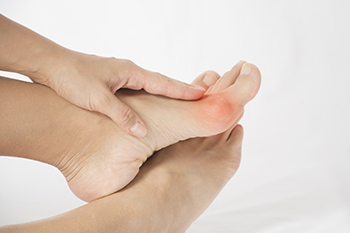 Bunions are a common foot deformity in which a bony bump slowly grows along the outside of the foot at the base of the big toe joint. Bunions can be painful, making walking and finding comfortable shoes particularly difficult. Conservative treatments such as resting and icing the foot and shoe modifications are usually the first line of treatment to address bunion symptoms and slow or prevent progression. However, surgery is also an option and can be used to relieve pain, improve foot stability, restore walking ability, improve the appearance of the foot, and prevent other deformities from developing. Whether or not you should consider surgery depends on the severity of the bunion, the impact that symptoms have on your daily life, and the presence of any other health conditions. To learn more about treatment options for bunions, please consult with a podiatrist.
Bunions are a common foot deformity in which a bony bump slowly grows along the outside of the foot at the base of the big toe joint. Bunions can be painful, making walking and finding comfortable shoes particularly difficult. Conservative treatments such as resting and icing the foot and shoe modifications are usually the first line of treatment to address bunion symptoms and slow or prevent progression. However, surgery is also an option and can be used to relieve pain, improve foot stability, restore walking ability, improve the appearance of the foot, and prevent other deformities from developing. Whether or not you should consider surgery depends on the severity of the bunion, the impact that symptoms have on your daily life, and the presence of any other health conditions. To learn more about treatment options for bunions, please consult with a podiatrist.
If you are suffering from bunions, contact Philip K. Schrumpf, DPM of Active Feet Clinic. Our doctor can provide the care you need to keep you pain-free and on your feet.
What Is a Bunion?
A bunion is formed of swollen tissue or an enlargement of boney growth, usually located at the base joint of the toe that connects to the foot. The swelling occurs due to the bones in the big toe shifting inward, which impacts the other toes of the foot. This causes the area around the base of the big toe to become inflamed and painful.
Why Do Bunions Form?
Genetics – Susceptibility to bunions are often hereditary
Stress on the feet – Poorly fitted and uncomfortable footwear that places stress on feet, such as heels, can worsen existing bunions
How Are Bunions Diagnosed?
Doctors often perform two tests – blood tests and x-rays – when trying to diagnose bunions, especially in the early stages of development. Blood tests help determine if the foot pain is being caused by something else, such as arthritis, while x-rays provide a clear picture of your bone structure to your doctor.
How Are Bunions Treated?
- Refrain from wearing heels or similar shoes that cause discomfort
- Select wider shoes that can provide more comfort and reduce pain
- Anti-inflammatory and pain management drugs
- Orthotics or foot inserts
- Surgery
If you have any questions, please feel free to contact our office located in Missoula, MT . We offer the newest diagnostic and treatment technologies for all your foot care needs.
